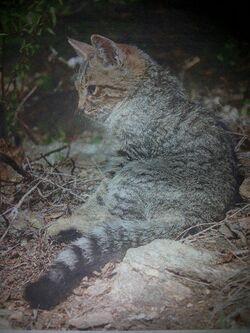Biology:Sardinian wildcat
| Sardinian wildcat | |
|---|---|

| |
| Local wildcat in Villagrande Strisaili | |
| Scientific classification Error creating thumbnail: Unable to save thumbnail to destination
| |
| Domain: | Eukaryota |
| Kingdom: | Animalia |
| Phylum: | Chordata |
| Class: | Mammalia |
| Order: | Carnivora |
| Suborder: | Feliformia |
| Family: | Felidae |
| Subfamily: | Felinae |
| Genus: | Felis |
| Species: | F. catus
|
| Binomial name | |
| Felis catus | |
| Synonyms | |
| |
The Sardinian wildcat (or, less commonly, the Sardinian lynx) is an isolated population of feral cats (Felis catus) on the island of Sardinia, introduced during the Roman Empire.[1] It has historically been misidentified as a species of lynx or a subspecies of wildcat.
Under the name Felis lybica sarda, it is locally protected as a rare species.[citation needed]
Taxonomic history
The population was first described as a wildcat as Felis libyca sarda by Fernand Lataste in 1885, based on the skin and skull of a male cat from Sarrabus in Sardinia, which he wrote resembled an African wildcat but more reddish, grey, and brown, and with longer hairs on the back.[2] Another name, Felis mediterranea, was also proposed for wildcats from Sardinia in 1896.[3]
In 1910 it was reclassified as Felis ocreate sarda,[4] while in 1912 it was considered a full species Felis sarda by Miller.[5]
The Sardinian lynx with the scientific name Lynx lynx sardiniae was proposed by the Italian biologist Pasquale Mola in 1908 for two zoological specimens of a cat from Nuoro in Sardinia that were part of the zoological collection of the University of Sassari.[6][7] These specimens were reassessed in 1911 by Alessandro Ghigi who identified them as Sardinian wildcats.[8] Gighi's assessment was corroborated in 1981 by an Italian biologist who examined the still available mounted specimen initially described by Mola.[9]
Following taxonomic changes around Felis lybica, an updated name is Felis lybica sarda.[citation needed] The term Felis silvestris lybica var. sarda, using an outdated name for the African wildcat, was also used in one paper.[10]
Results of zooarchaeological research indicate that Sardinian wild cats descended from domestic cats that were introduced around the beginning of the first millennium during the Roman Empire, and probably originated in the Near East.[11][1]
Description
Mola described the body length of these specimens as 50 cm (20 in) with a 25 cm (9.8 in) long tail and a shoulder height of 35 cm (14 in). Their long and dense fur was fulvous on the back and whitish on the belly. He considered them to be a crossing of a lynx and a domestic cat.[6][7]
See also
References
- ↑ 1.0 1.1 Gippoliti, S.; Amori, G. (2006). "Ancient introductions of mammals in the Mediterranean Basin and their implications for conservation". Mammal Review 36 (1): 37–48. doi:10.1111/j.1365-2907.2006.00081.x. https://www.researchgate.net/publication/228048823.
- ↑ Lataste, Fernand (1885). "Étude de la Faune de Vertébrés de Barbarie (Algérie, Tunisie et Maroc)". Actes de la Société Linnéenne de Bordeaux. Quatrième Série 39: 129–296. https://archive.org/details/actesdelasocilin3985soci/page/231.
- ↑ Martorelli (January 1896). Atti Soc. Ital. Sci. Nat., Milano XXXV: 266.
- ↑ Trouessart. Faune Mamm. d'Europe: 101.
- ↑ Miller (1912). Catalogue of the Mammals of Western Europe. pp. 468. https://books.google.com/books?id=AL4yAQAAMAAJ&q=Felis+sarda+Lataste.
- ↑ 6.0 6.1 Mola, P. (1908). "Considerazioni sopra un problematico incrocio di Felidi". Bollettino della Società zoologica italiana. 2 9: 42–45. https://archive.org/details/bollettino2919soci/page/42.
- ↑ 7.0 7.1 Mola, P. (1908). "Ancora della Lince della Sardegna". Bollettino della Società zoologica italiana. 2 9: 46–48. https://archive.org/details/bollettino2919soci/page/46.
- ↑ Ghigi, A. (1911). Ricerche faunistiche e sistematiche sui Mammiferi d'Italia che formano oggetto di caccia. Natura. II. Pavia: Tipografia Successori Fratelli Fusi. pp. 7–48.
- ↑ Ragni, B. (1981). "Gatto selvatico. Felis silvestris Schreber, 1777". Distribuzione e biologia di 22 specie di Mammiferi in Italia. Rome: Consiglio Nazionale delle Ricerche. pp. 105–113.
- ↑ Mura, A.; Gadau, S.; Zedda, M. (2013). "Morphological and morphometrical features of Sardinian wild cat (Felis silvestris lybica var. Sarda)". Journal of Biological Research - Bollettino della Società Italiana di Biologia Sperimentale 86. doi:10.4081/jbr.2013.3673. https://www.researchgate.net/publication/269651646.
- ↑ Vigne, J.-D. (1992). "Zooarchaeology and the biogeographical history of the mammals of Corsica and Sardinia since the last ice age". Mammal Review 22 (2): 87–96. doi:10.1111/j.1365-2907.1992.tb00124.x. http://www.academia.edu/download/46314275/Zooarchaeology_and_the_Biogeographical_h20160607-30777-1e6lk2e.pdf.[|permanent dead link|dead link}}]
Wikidata ☰ Q3655943 entry
 |

